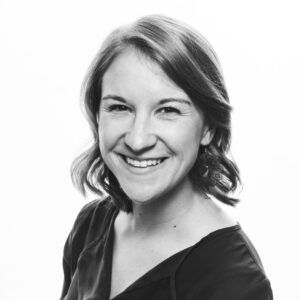Anne Griffin is the worship and implementation pastor at Trailhead Church, a member of Denver Institute’s Church Partnership Network. We spoke recently about how she engages in conversations about faith and work, and how her connections with other church leaders have empowered her to learn more about vocation for herself and for the sake of others.
You attended a Denver Institute event where church leaders from across our city gathered to talk about faith and work in their communities, and particularly how to facilitate faith and work conversations with women. What were some of your biggest takeaways?
My biggest takeaway was that I left feeling really affirmed. At Trailhead, we believe that all people are called to God's mission in the world, and it was so encouraging to have an honest conversation about that with other ministry leaders.
As much as we're making strides in churches and culture to value women and their roles in work and leadership, there's still quite a bit of a gap a lot of the time. I realized our silence may send a message that doesn’t match up with what we believe. We need to verbalize what we believe about women and their roles, so that they know we value them in whatever place God has called them to be.
Are there practical things you plan to implement in worship or community life at your church as a result of the discussion?
After hosting past conversations about faith and work during our worship gatherings, several moms have approached me saying, “I don’t know how my story is valuable.” Stemming from these interactions, I’d say there’s still a lot of cultural tradition that makes it hard for us as women to know the value we have and the roles we can play in God's kingdom here on earth.
This ongoing conversation challenges me to speak more boldly to women about who they are and who God created them to be. And, more than that, it’s important to remind myself and our church that both women and men are exactly who God has created them to be, and that all people are created to proclaim the gospel.
Women often think that they have to have super qualities or characteristics in order to lead. I’ve had women tell me that they don't know their Bible enough, so they can’t lead a small group, or they don’t feel that they have the outspoken nature that we often identify with leadership. I was challenged to see the people that we might be missing, who might need to be mentored toward leadership. How are we looking for those people? How can I have eyes to see them and then give them opportunities to use skills they have for the church?
How do you encourage people in your community at Trailhead Church to connect their work with worship?
We try to talk about how the gospel affects all of life, and we do that in a lot of ways.
At Trailhead, one of the ways we try to affirm vocation is by hosting interviews in church with members of our congregation from different backgrounds. We ask them about what they do, how they bear God’s image in their work, how they experience brokenness, and how they see ways to love their neighborhood. We get people thinking creatively about how their work matters.
We also host short-term, small group discussions called Learning Communities that are designed around topical conversation. We’ve hosted these on vocational topics. I helped host one on “women, work and calling,” and it allowed a 6-week conversation around what it means to live in the tensions of motherhood, work, schedules and all of those things.
And finally, we try to do a preaching series on vocation at least once a year. Even though we aim to talk about those things regularly, we also set aside a specific time each year to focus on that.
Why do you think it is important for church leaders to be connected to one another, and to organizations like the Denver Institute?
I think that it's always great to hear the stories of how other people are talking about vocation. When we gather at Denver Institute, we know we’re there to talk about the integration of faith and work, and learn how other churches are doing that. We can share our triumphs and our struggles. There is no magical formula, but it’s a great space to encourage each other.
I also appreciate the opportunity to hear from a variety of perspectives. It was really cool to sit in a room of church leaders that might not even agree about the role of women in churches, but still have a really beautiful and honest conversation about leadership, women and value. We are not only encouraged in our work, but also challenged to think bigger and to think differently.
Denver Institute does a great job offering challenging and interesting conversations. For me, the organization helps us stretch our imaginations about what the integration of faith and work could look like. From conversations about retirement and finance to art and social justice, I come away feeling appreciated, affirmed and cared for as a church leader. I leave feeling empowered to go and serve our church and our city.

